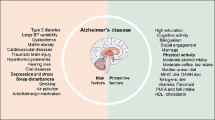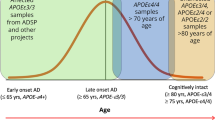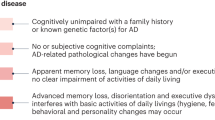Abstract
Haplotype associations of 894 DNA samples of elderly people from the Russian population of Tomsk were analyzed using 49 SNPs (single nucleotide polymorphisms). As the analyzed markers, SNPs were selected that showed an association with Alzheimer’s disease or variability of cognitive abilities in genome-wide association studies. As a result of the analysis, blocks on chromosomes 1, 2, 6, 8, 11, 19, and 20 were identified. Significant associations were shown, taking into account 50 000 permutations, for haplotypes localized on chromosomes 1 and 19 in the genes CR1 and APOE, APOC1, respectively. Our results confirm the role of the APOE and CR1 genes in the pathogenesis of Alzheimer’s disease in the Russian population.

Similar content being viewed by others
REFERENCES
Cummings, J.L., Alzheimer’s disease, N. Engl. J. Med., vol. 351, no. 1, pp. 56—67. https://doi.org/10.1056/NEJMra040223
Zhu, Z., Lin, Y., Li, X., et al., Shared genetic architecture between metabolic traits and Alzheimer’s disease: a large-scale genome-wide cross-trait analysis, Hum. Genet., 2019, vol. 138, no. 3, pp. 271—285. https://doi.org/10.1007/s00439-019-01988-9
Jansen, I.E., Savage, J.E., Watanabe, K., et al., Genome-wide meta-analysis identifies new loci and functional pathways influencing Alzheimer’s disease risk, Nat. Genet., 2019, vol. 51, no. 3, pp. 404—413. https://doi.org/10.1038/s41588-018-0311-9
Zhu, X.C., Yu, J.T., Jiang, T., et al., CR1 in Alzheimer’s disease, Mol. Neurobiol., 2015, vol. 51, no. 2, pp. 753—765. https://doi.org/10.1007/s12035-014-8723-8
Zhang, S., Li, X., Ma, G., et al., Polymorphism contributes to Alzheimer’s disease susceptibility in Caucasian but not East Asian populations, Mol. Neurobiol., 2016, vol. 53, no. 3, pp. 1446—1451. https://doi.org/10.1007/s12035-015-9098-1
Trifonova, E.A., Spiridonova, M.G., Gabidulina, T.V., et al., Analysis of the MTHFR gene linkage disequilibrium structure and association of polymorphic gene variants with coronary atherosclerosis, Russ. J. Genet., 2012, vol. 48, no. 10, pp. 1035—1047. https://doi.org/10.1134/S1022795412100122
Slatkin, M., Linkage disequilibrium—understanding the evolutionary past and mapping the medical future, Nat. Rev. Genet., 2008, vol. 9, no. 6, pp. 477—485. https://doi.org/10.1038/nrg2361
Lawson, D.J., Hellenthal, G., Myers, S., and Falush, D., Inference of population structure using dense haplotype data, PLoS Genet., 2012, vol. 8, no. 1. E.1002453. https://doi.org/10.1371/journal.pgen.1002453
Makeeva, O., Markova, V., Zhukova, I., et al., A comparison of neuropsychological performance between US and Russia: preparing for a global clinical trial, Alzheimers Dement., 2014, vol. 10, no. 6, pp. 760—768. https://doi.org/10.1016/j.jalz.2014.02.008
Stepanov, V.A., Bocharova, A.V., Vagaitseva, K.V., et al., A rare variant in the sortilin-related receptor 1 gene is associated with declined cognitive functions in the elderly, Zh. Nevrol. Psikhiatrii im. S.S. Korsakova, 2018, vol. 118, no. 5, pp. 92—95. https://doi.org/10.17116/jnevro20181185192
Lambert, J.C., Heath, S., Even, G., et al., Genome-wide association study identifies variants at CLU and CR1 associated with Alzheimer’s disease, Nat. Genet., 2009, vol. 41, no. 10, pp. 1094—1099. https://doi.org/10.1038/ng.439
Fulmer, T., APOE in AD, Sci.—Business eXch., 2012, vol. 5, no. 9, p. 221. https://doi.org/10.1038/scibx.2012.221
Author information
Authors and Affiliations
Corresponding author
Ethics declarations
Conflict of interest. The authors declare that they have no conflict of interest.
Statement of compliance with standards of research involving humans as subjects. All procedures performed in a study involving people comply with the ethical standards of the institutional and/or national committee for research ethics and the 1964 Helsinki Declaration and its subsequent changes or comparable ethical standards. Each of the participants in the study gave informed consent.
Rights and permissions
About this article
Cite this article
Vagaitseva, K.V., Bocharova, A.V., Kolesnikova, E.A. et al. Analysis of the Association of Haplotypes with Alzheimer’s Disease and Mild Cognitive Impairment in the Russian Population. Russ J Genet 56, 1272–1276 (2020). https://doi.org/10.1134/S1022795420100130
Received:
Revised:
Accepted:
Published:
Issue Date:
DOI: https://doi.org/10.1134/S1022795420100130




